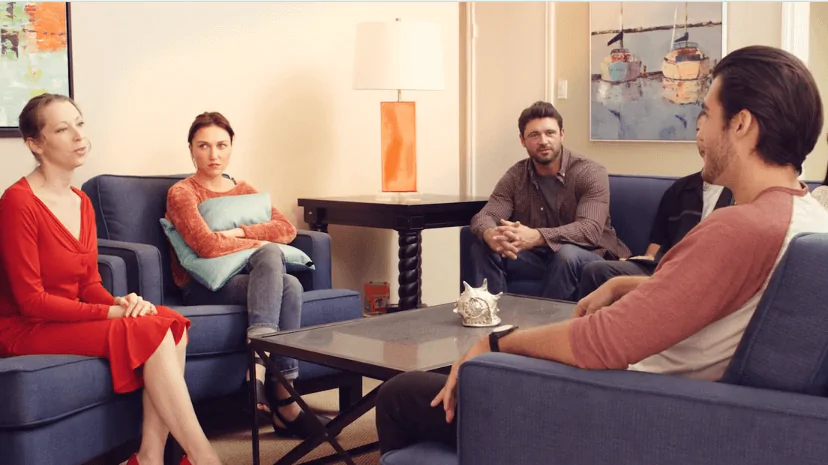24/7 Helpline:
(866) 899-221924/7 Helpline:
(866) 899-2219
Learn more about OCD Treatment centers in Pasadena
OCD Treatment in Other Cities

Other Insurance Options

Optima
Beacon

United Health Care

Choice Care Network

Evernorth

Regence

Meritain

Coventry Health Care

Health Partners

BHS | Behavioral Health Systems

BlueShield

Premera

Providence

Sliding scale payment assistance

Absolute Total Care

AllWell

PHCS Network

Amerigroup

CareFirst

MVP Healthcare

Walter Hoving Home
Walter Hoving Home is a non-profit rehab located in Pasadena, CA. The Hoving Home is a residential s...

Pasadena Public Health Department – Social & Mental Health Division
Pasadena Public Health Department - Social & Mental Health Division is a public rehab located in Pas...

Casa Treatment Center
Founded in 1967, Casa Treatment Center is the first recovery home in Pasadena to specifically cater ...

The Arroyos Treatment Centers
The Arroyos Treatment Centers provides multidisciplinary treatment for mental health and chemical de...

Pasadena Recovery Center
Pasadena Recovery Center offers outpatient and inpatient treatment for individuals with alcohol and/...

Pasadena Council on Alcohol and Drug Dependency
Pasadena Council on Alcohol and Drug Dependency offers outpatient treatment for individuals with alc...

AEGIS Treatment Centers – Pasadena
AEGIS Medical Systems is an outpatient rehab located in Pasadena, CA. AEGIS Medical Systems speciali...

Casa de las Amigas – Drug and Alcohol Rehab for Women
Casa de las Amigas – Drug and Alcohol Rehab for Women is an addiction treatment center located in Pa...

Impact Drug and Alcohol Treatment Center
Located in Pasadena, California, Impact Drug and Alcohol Treatment Center provides treatment for alc...

The High Road Program
The High Road Program provides education and substance abuse counseling for individuals referred thr...

Pacific Clinics – Hurlbut Street
Pacific Clinics – Hurlbut Street is a private rehab located in Pasadena, California. Pacific Clinics...

Pacific Clinics – Lake Avenue
Pacific Clinics – Lake Avenue is a private rehab located in Pasadena, California. Pacific Clinics – ...

The Gooden Center
The Gooden Center offers inpatient treatment for individuals with alcohol and/or substance addiction...

Dedicato Treatment Center – Outpatient
Dedicato Treatment Center - Outpatient is a private rehab located in Pasadena, CA. Dedicato Treatmen...

Insight Treatment Program for Teens and Families – Pasadena
Insight Treatment Program for Teens and Families is a rehab facility located throughout Greater LA a...

Tranquility Woods Treatment
Tranquility Woods Treatment is a drug and alcohol rehab located in Pasadena, MD. They provide reside...

Evolve Life Centers
Evolve Life Centers in Pasadena, MD is an alcohol and drug abuse recovery center for adults. This re...

New Hope Women’s Center
New Hope Women’s Center is a private rehab located in Pasadena, Texas. New Hope Women’s Center speci...

Pasadena Substance Abuse Clinic
Pasadena Substance Abuse Clinic is a private rehab located in Pasadena, Texas. Pasadena Substance Ab...

Bay Area Recovery Center
Bay Area Recovery Center stands as a reputable, faith-led drug and alcohol addiction treatment rehab...

Positive Recovery Center – Pasadena
Positive Recovery Center – Pasadena is a private rehab located in Pasadena, Texas. Positive Recovery...

Unlimited Visions Aftercare
Unlimited Visions Aftercare is located in Pasadena, Texas. Unlimited Visions Aftercare provides high...










Casa Maria Transitional Housing Program
Casa Maria Transitional Housing Program is a private rehab located in Pasadena, California. Casa Mar...

Back to Life Transitional Living
Back to Life Transitional Living is a private rehab located in Pasadena, California. Back to Life Tr...

Uncle Dave’s Transitional Sober Living Home
Uncle Dave’s Transitional Sober Living Home is a private rehab located in Pasadena, California. Uncl...

Fuller Psychological and Family Services
Fuller Psychological and Family Services is a private rehab located in Pasadena, California. Fuller ...

California Drug Counseling
California Drug Counseling is a private rehab located in Pasadena, California. California Drug Couns...

Foothill Family – Oak Knoll Avenue
Foothill Family – Oak Knoll Avenue is a private rehab located in Pasadena, California. Foothill Fami...

The 202 Club
The 202 Club is a non-profit rehab located in Pasadena, California. The 202 Club specializes in the ...

Absolute Control Transitional Counseling Center
Absolute Control Transitional Counseling Center is a private rehab located in Pasadena, California. ...

AA – Alcoholics Anonymous – Groupo Pasadena
AA – Alcoholics Anonymous – Groupo Pasadena is a non-profit rehab located in Pasadena, California. A...

Assessment Intervention Resources
Assessment Intervention Resources is a private rehab located in Pasadena, California. Assessment Int...

URDC Human Services
URDC Human Services is a private rehab located in Pasadena, California. URDC Human Services speciali...

California Drug Consultants
California Drug Consultants is a private rehab located in Pasadena, California. California Drug Cons...

HealthRIGHT 360 Prototypes Outpatient Behavioral Hlth
HealthRIGHT 360 Prototypes Outpatient Behavioral Hlth is a non-profit rehab located in Pasadena, Cal...

Action Family Counseling
Action Family Counseling - East Foothill Boulevard offers intensive outpatient services for individu...

Alcohol and Drug Abuse Education – The Horizons
Alcohol and Drug Abuse Education – The Horizons is a private rehab located in Pasadena, Maryland. Al...

AA – Alcoholicos Anonimos – Grupo Serenida
AA – Alcoholicos Anonimos – Grupo Serenida is a non-profit rehab located in Pasadena, Texas. AA – Al...

All About Recovery
All About Recovery is a private rehab located in Pasadena, Texas. All About Recovery specializes in ...

The Right Step
The Right Step offers outpatient treatment for individuals with alcohol and/or substance addiction. ...

AA – Alcoholics Anonymous – Legacy Club
AA – Alcoholics Anonymous – Legacy Club is a non-profit rehab located in Pasadena, Texas. AA – Alcoh...

Innovative Alternatives – Cleveland Ripley
Innovative Alternatives - Cleveland-Ripley is a non-profit outpatient clinic that provides counselin...

Innovative Alternatives – Project Joy & Hope
Innovative Alternatives - Project Joy & Hope is a non-profit outpatient clinic that provides counsel...